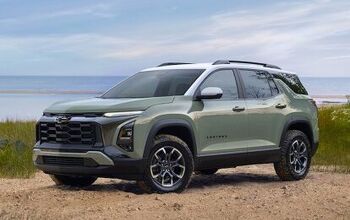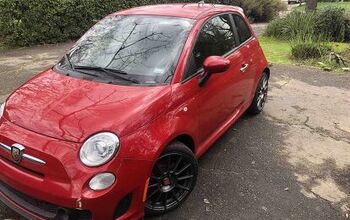Study: Catalytic Converter Thefts Are Slowly Declining

Catalytic converter theft has become a popular pastime for criminals looking to make a quick buck in the United States. Instances of stolen units have absolutely exploded in recent years, reaching a point where some law enforcement departments have gone out of their way to specifically target organized groups bent on stealing the devices.
State Farm is reporting that the situation is finally getting better in America. While technically true, theft rates remain staggeringly high across the country.
Implemented during the Malaise Era, when the U.S. regulators seemed absolutely committed to ruining vehicles via the Clean Air Act, catalytic converters would become mandatory hardware on all exhaust systems by 1975. The premise was to use the devices and a lot of heat to convert exhaust gasses like nitrogen dioxide or carbon monoxide into something less harmful by running them through a honeycombed catalyst that changes their chemical makeup.
But the materials used in this process require catalytic converters to be loaded up with precious metals like palladium, rhodium, and platinum. This has always made the units desirable components to pull off a junker. But we hadn’t seen a lot of organized theft of the devices until fairly recently.
In 2020, society was effectively paused as people were told to stay indoors by healthcare officials and the government. As a byproduct, many jobs were lost and certain types of crime skyrocketed. However, we also saw prices spike on all sorts of raw materials, including the precious metals that go into catalytic converts.
According to data from the National Insurance Crime Bureau (NICB), there were just 1,298 reported instances of catalytic converter theft in 2018. But that number jumped up to 3,389 by 2019 and exploded to a whopping 14,433 in 2020. That’s an over 1000-percent increase in just two short years.
It wasn’t long after that when the country started seeing rolling reports about upticks in crime, with car crime being exceptionally popular. Even the Oscar Mayer Wienermobile ended up getting chopped.
State Farm reported that it had received over 45,000 catalytic converter theft claims in 2022 alone. But 2023 seems to be shaping up to be a better year, albeit nowhere near as good as it was before the world was flipped upside down.
The insurance agency has recorded 14,500 claims of catalytic converter theft between January and July 2023. While it suggests the data represented a dramatic decline, that’s only if we’re comparing it to the previous year where the insurer reported a staggering 23,000 thefts within the same time frame.
As victories go, this is a minor one.
We can speculate about what might have contributed to the drop in claims. There has certainly been more enforcement on the matter, especially on the West Coast where instances seem the most concentrated. Stolen catalytic converters used to be the kind of opportunistic crime police rarely bothered solving. However, authorities have since taken action against several organized groups and there’s been a rash of companies offering devices that make catalytic converters harder to steal. Most of these just wrap the exhaust system in reinforced steel cables that would be difficult to run a Sawzall through. But that’s often enough to discourage thieves who are just looking to make quick work of vehicles with enough ground clearance to shimmy under.
If you’re wondering how at-risk your vehicle might be (keeping population density in mind), State Farm released data on which states saw the most reports of theft through the first half of 2023. California was at the tippy top with over 5,400 claims, Texas was next with 1,450 claims, and Illinois was third with 1,300 claims. The rest of the top ten include Colorado, New York, Pennsylvania, Georgia, Minnesota, Florida, and Washington — all of which ranged between 300 and 600 claims.
The company's recommendations for avoiding having your catalytic converter stolen were pretty basic. State Farm suggested parking inside a garage or in well-lit areas, installing a “sensitive” alarm system, engraving your VIN onto the unit you’re worried about being stolen, and having a security camera pointing at your car 24/7.
[Image: fru-fru/Shutterstock]
Become a TTAC insider. Get the latest news, features, TTAC takes, and everything else that gets to the truth about cars first by subscribing to our newsletter.

A staunch consumer advocate tracking industry trends and regulation. Before joining TTAC, Matt spent a decade working for marketing and research firms based in NYC. Clients included several of the world’s largest automakers, global tire brands, and aftermarket part suppliers. Dissatisfied with the corporate world and resentful of having to wear suits everyday, he pivoted to writing about cars. Since then, that man has become an ardent supporter of the right-to-repair movement, been interviewed on the auto industry by national radio broadcasts, driven more rental cars than anyone ever should, participated in amateur rallying events, and received the requisite minimum training as sanctioned by the SCCA. Handy with a wrench, Matt grew up surrounded by Detroit auto workers and managed to get a pizza delivery job before he was legally eligible. He later found himself driving box trucks through Manhattan, guaranteeing future sympathy for actual truckers. He continues to conduct research pertaining to the automotive sector as an independent contractor and has since moved back to his native Michigan, closer to where the cars are born. A contrarian, Matt claims to prefer understeer — stating that front and all-wheel drive vehicles cater best to his driving style.
More by Matt Posky
Latest Car Reviews
Read moreLatest Product Reviews
Read moreRecent Comments
- FreedMike I don't see why you can't have both EVs and conventionally powered cars.
- Zerofoo We leased a new CX-5 for my daughter when she started driving. We put nothing down and bought gap insurance. The theory was if she totaled the car, it was nothing more than a rental. If she kept the car in good shape and the car was reliable, we would, at the end of the lease, have the opportunity to buy a low-mileage 3 year old used car.
- Peter KODAK Moment
- Eliyahu Toyota has looked at the state of the world and decided that hybrids are the best fit for currently achieving environmental and regulatory goals. Their hybrid production is now across many of their models. Honda is following suit. They will both likely also produce some electric vehicles. The best path forward is likely higher fuel taxes, with some tax credit offsets for the lower tax brackets. This would encourage a move toward more fuel efficient vehicles. The US big 3 auto makers are the ones with the most to lose here-they are the late adapters-coasting on trucks.
- 28-Cars-Later Used Teslas are getting very cheap, but buying one can be risky - Ars Technica Teslas are very connected cars, and many of their convenience features are accessed via smartphone apps. But that requires that Tesla's database shows you as the car's owner, and there are plenty of reports online that transferring ownership from Hertz can take time.Unfortunately, this also leaves the car stuck in Chill driving mode (which restricts power, acceleration, and top speed) and places some car settings outside of the new owner's level of access. You also won't be able to use Tesla Superchargers while the car still shows up as belonging to Hertz. Based on forum reports, contacting Tesla directly is the way to resolve this, but it can take several days to process; longer if there's a paperwork mismatch.Once you've transferred ownership to Tesla's satisfaction, it's time to do a software reset on the car to remove the fleet version.So apparently the state maintains title but so does Tesla in a way, and they cripple some features until they feel satisfied in unlocking them to you. How long till they brick it by satellite because, reasons? But yes, rah! rah! BEV! - its not a tool of tyranny at all, honest. Edit: Comment from the Ars forum: Happy MediumArs Tribunus Militum 19y When I got to the section that stated that THE CAR WILL BE FUNCTIONALLY CRIPPLED unless you get Tesla's acceptance of you buying the car, I got incredibly infuriated. How in the hell is this going to work going forwards? Is Tesla literally going to be approving every single resale of its cars from now until the car is totaled? Jeezus, connected is one thing, but having final ownership authority in the hands of the manufacturer and not the seller/purchaser seems horrible. 28's thoughts to Happy Medium.


































Comments
Join the conversation
After all the catalytic converters were stolen off our company's vans, we had cages welded around all the replacement converters. They haven't been stolen since.
I suspect countermeasures have been taken by most victims, so the rate of repeat theft is now declining.
Scrap dealers should only take catalytic converter from certified auto shops and force private people to turn home replacement catalytic to any muffler shop for them to properly despose. No cash incentive. This should end theft if they couldn't deal directly with recyclers for cash.